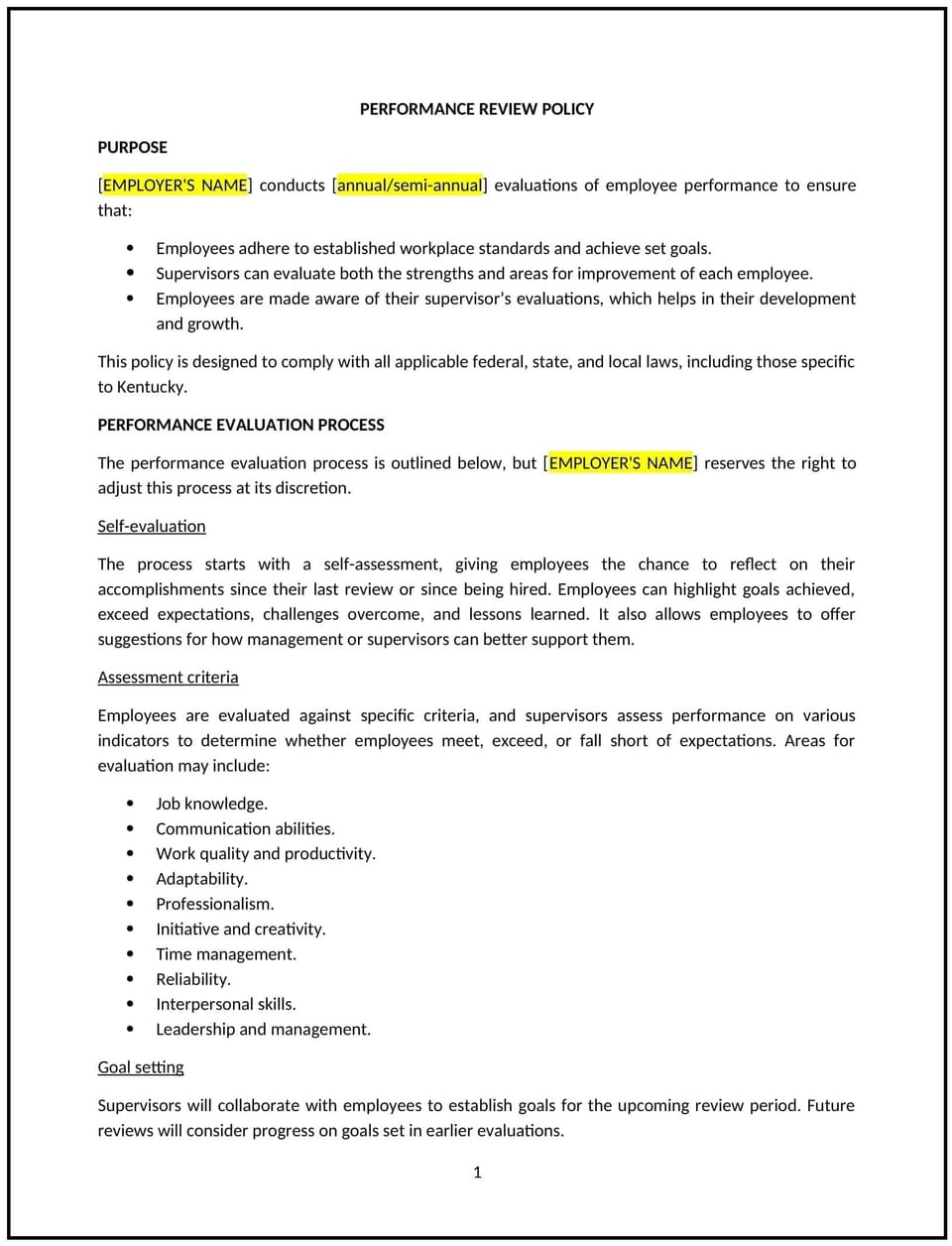Performance review policy (Kentucky): Free template

Performance review policy (Kentucky)
A performance review policy provides Kentucky businesses with a structured approach to evaluating employee performance, setting goals, and offering feedback. This policy ensures that reviews are conducted fairly and consistently, fostering employee development and aligning individual contributions with business objectives.
By adopting this policy, businesses can enhance communication, identify areas for improvement, and reward high performance effectively.
How to use this performance review policy (Kentucky)
- Define review frequency: Establish how often performance reviews will be conducted, such as annually, semi-annually, or quarterly, and communicate the schedule to employees.
- Set clear objectives: Outline the purpose of the reviews, such as assessing performance, identifying growth opportunities, and aligning goals with business priorities.
- Standardize the process: Develop a consistent format for reviews, including evaluation criteria, feedback forms, and goal-setting templates.
- Provide manager training: Equip managers with the skills and tools needed to conduct effective, unbiased, and constructive reviews.
- Emphasize two-way feedback: Create an environment where employees feel comfortable sharing their perspectives and receiving actionable feedback.
- Link reviews to rewards: Connect performance evaluations to promotions, raises, or bonuses to motivate and recognize high-performing employees.
- Address underperformance: Include a process for identifying and addressing performance gaps, such as creating performance improvement plans (PIPs).
Benefits of using this performance review policy (Kentucky)
This policy provides several key benefits for Kentucky businesses:
- Enhances employee growth: Encourages professional development through constructive feedback and goal setting.
- Improves communication: Fosters open dialogue between employees and managers, strengthening workplace relationships.
- Aligns goals: Ensures individual and team objectives are aligned with the business’s overall strategy.
- Promotes fairness: Establishes a standardized process for evaluating performance, reducing bias and subjectivity.
- Recognizes achievement: Provides a formal mechanism for acknowledging and rewarding employee contributions.
Tips for using this performance review policy (Kentucky)
- Communicate the policy: Share the policy with all employees during onboarding and provide reminders before each review cycle.
- Use measurable criteria: Focus on objective metrics and specific examples to ensure evaluations are clear and actionable.
- Incorporate self-assessments: Allow employees to evaluate their own performance as part of the review process to encourage reflection and engagement.
- Follow up on reviews: Regularly check in on progress toward goals and provide additional feedback between formal review cycles.
- Review periodically: Update the policy as needed to reflect changes in workplace dynamics, employee feedback, or Kentucky regulations.
Q: How often should performance reviews be conducted?
A: Performance reviews may be conducted annually, semi-annually, or quarterly, depending on the business’s goals and operational needs.
Q: What is the purpose of a performance review?
A: Performance reviews help evaluate employee performance, set goals, provide feedback, and align individual contributions with business objectives.
Q: What criteria are used to evaluate performance?
A: Criteria may include job-specific skills, productivity, teamwork, communication, and achievement of individual or team goals.
Q: How can businesses ensure fairness in reviews?
A: Standardizing the process, providing manager training, and using measurable criteria help promote consistency and reduce bias in evaluations.
Q: What should businesses do if an employee is underperforming?
A: Businesses can address underperformance by creating a performance improvement plan (PIP) that outlines specific goals, timelines, and resources for improvement.
Q: Are performance reviews linked to raises or promotions?
A: Businesses may tie performance reviews to compensation decisions, such as raises, bonuses, or promotions, to reward high-performing employees.
Q: How should businesses follow up after a review?
A: Managers can schedule regular check-ins to track progress, provide ongoing feedback, and adjust goals as needed to support employee development.
Q: How often should the performance review policy be reviewed?
A: The policy should be reviewed periodically to ensure it aligns with evolving business needs, employee feedback, and best practices.
This article contains general legal information and does not contain legal advice. Cobrief is not a law firm or a substitute for an attorney or law firm. The law is complex and changes often. For legal advice, please ask a lawyer.


